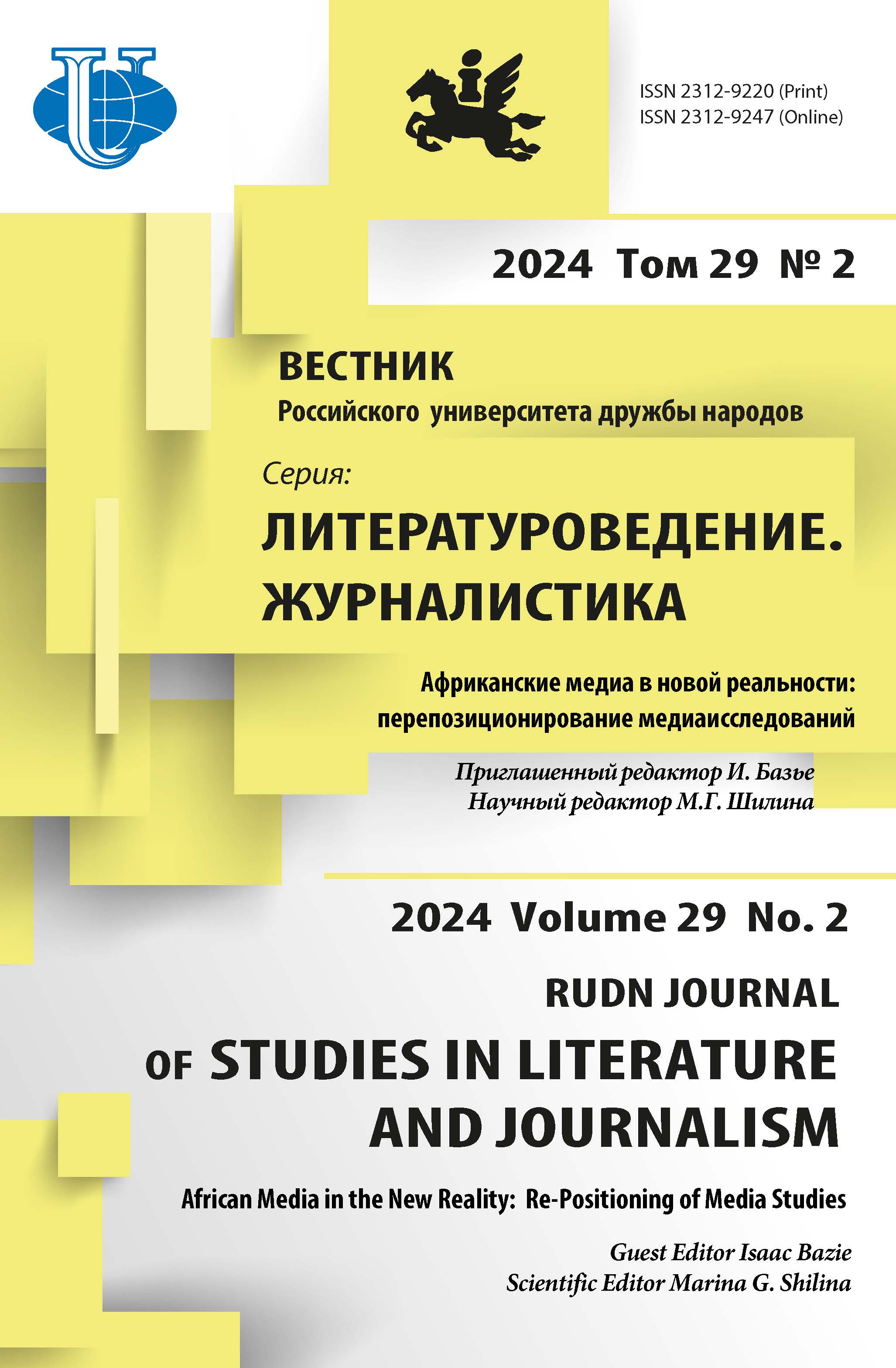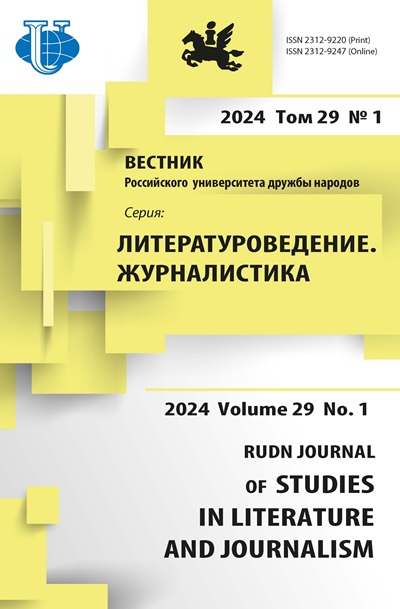The Times’ conceptual approaches to covering military coups in Africa
- Authors: Yakova T.S.1, Kolesnichenko A.V.1, Danilina I.O.1
-
Affiliations:
- Lomonosov Moscow State University
- Issue: Vol 29, No 1 (2024)
- Pages: 114-124
- Section: JOURNALISM
- URL: https://journals.rudn.ru/literary-criticism/article/view/40031
- DOI: https://doi.org/10.22363/2312-9220-2024-29-1-114-124
- EDN: https://elibrary.ru/FSMFFK
Cite item
Full Text
Abstract
The article presents the results of the study of the British newspaper The Times' approaches to covering the military coups in Gabon and Niger in 2023. The research methodology included quantitative and qualitative content analysis and analysis of publications according to the criteria of the concept of constructive journalism. The empirical base consisted of The Times articles for the first 10 months of 2023. The results of the comparative analysis of the texts showed that the publications do not comply with the principles of the concept of constructive journalism and do not take into account the basic methods of positive psychology. Russia is mentioned in most publications in the context of military cooperation in the region, with half of the publications being neutral and the rest negative. In part of the publications negative characteristics are given without arguments, references to documents, to statements of the Russian leadership with the designation of Russia's position. Such publications are characterized by their focus on discrediting cooperation between African countries and Russia. This cooperation is assessed as a way to lead to crisis and deterioration of security in the region. At the same time, journalists express in their publications only their own views and do not provide assessments and opinions of experts of international organizations and citizens of African states.
Keywords
About the authors
Tamara S. Yakova
Lomonosov Moscow State University
Author for correspondence.
Email: t-yakova@mail.ru
ORCID iD: 0000-0002-5640-267X
PhD in Philology, Associate Professor, Department of Foreign Journalism and Literature, Faculty of Journalism
9 Mokhovaya St, bldg 1, Moscow, 125009, Russian FederationAlexander V. Kolesnichenko
Lomonosov Moscow State University
Email: april-7@yandex.ru
ORCID iD: 0000-0003-3972-5247
PhD in Philology, Associate Professor, Department of Digital Journalism, Faculty of Journalism
9 Mokhovaya St, bldg 1, Moscow, 125009, Russian FederationIlona O. Danilina
Lomonosov Moscow State University
Email: danilina.ilona.olegovna@mail.ru
ORCID iD: 0009-0003-3120-1569
Master’s Student, Department of Foreign Journalism and Literature, Faculty of Journalism
9 Mokhovaya St, bldg 1, Moscow, 125009, Russian FederationReferences
- Biersteker, T. (2019). Understanding effectiveness of international sanctions. MGIMO Review of International Relations, 66(3), 7–16. https://doi.org/10.24833/2071-8160-2019-3-66-7-16
- Bro, P. (2019). Constructive journalism: Proponents, precedents, and principles. Journalism, 20(4), 504–519. https://doi.org/10.1177/1464884918770523
- Chuprygin, A.V., Chuprygina, L.A., & Matrosov, V.A. (2021). Libya, the United States and Russia in an endless game of checkers. Russia in Global Affairs, 19(3), 50–63. (In Russ.) https://doi.org/10.31278/1810-6374-2021-19-3-50-63
- Fedorchenko, A., Krylov, A., Morozov, V., Shebalina, E., & Loshkarev, I. (2022). Russian–African cooperation and summit diplomacy. Challenges and opportunities. International Trends, 20(4), 37–51. (In Russ.) https://doi.org/10.17994/IT.2022.20.4.71.4
- Gemueva, K.A. (2020). Chinese economic presence in East Africa: The case of Kenya. MGIMO Review of International Relations, 13(3), 112–137. (In Russ.) https://doi.org/10.24833/2071-8160-2020-3-72-112-137
- Glukhova, A.V., & Timofeeva L.N. (2016). Russian political conflict studies: State and problems. Political Science, (2), 13–39. (In Russ.)
- Gyldensted, C. (2015). From mirrors to movers: Five elements of positive psychology in constructive journalism. Charleston, SC: Group Publishing.
- McIntyre, K. (2015). Constructive journalism: The effects of positive emotions and solution in- formation in news stories. PhD Thesis, University of North Carolina, Chapel Hill, NC.
- Merkley, E. (2020). Are experts (news) worthy? Balance, conflict, and mass media coverage of expert consensus. Political Communication, 37(4), 530–549. https://doi.org/10.1080/10584609.2020.1713269
- Nikitin, A.I. (2006). International conflicts and their resolution. World Economy and Inter- national Relations, (2), 3–16. (In Russ.)
- Safranchuk, I.A., Nesmashnyi, A.D., & Chernov, D.N., (2023). Africa and the Ukraine crisis: Exploring attitudes. Russia in Global Affairs, 21(3), 159–180. https://doi.org/10.31278/1810-6374-2023-21-3-159-180
- Surkov, N.Y. (2020). Charismatic leadership in the Middle East and North Africa in the 21st century: regional specifics and prospects for the evolution of the phenomenon. MGIMO Review of International Relations, 13(2), 123–140. (In Russ.) https://doi.org/10.24833/2071-8160-2020-2-71-123-140
- Vartanova, Е., Gladkova, А., & Dunas, D. (2023). On representation of conflict in modern academic discourse. Online Media and Global Communication, 1(4), 794–814. https://doi.org/10.1515/omgc-2022-0063
- Wasserman, H. (2019). Media, conflict and democratisation in Africa: Political communication by other means. Media Linguistics, 6(4), 429–440. https://doi.org/10.21638/spbu22.2019.401
- Yakova, T.S. (2023). Conceptual approaches to covering international conflicts. Medi@lmanakh, 117(4), 68−78. (In Russ.) https://doi.org/0.30547/mediaalmanah.4.2023.6878
















